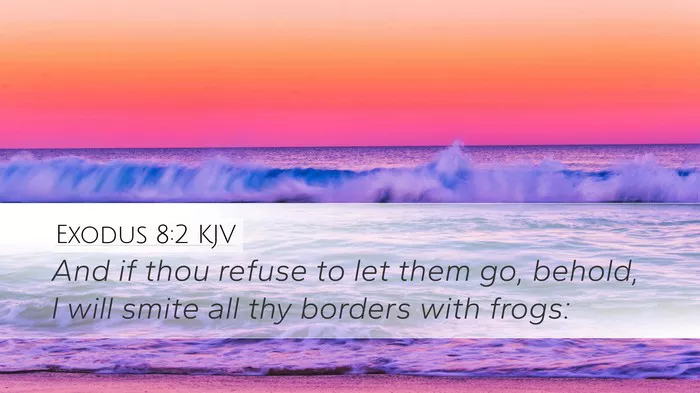Read the Daily Bible Verse – Exodus 8:2 To Strengthen Your Spiritual Journey.
Exodus 8:2 (KJV) states:
“And if thou refuse to let them go, behold, I will smite all thy borders with frogs.”
This verse is part of God‘s warning to Pharaoh through Moses, highlighting His authority, judgment, and persistence in liberating the Israelites. It is the prelude to the second plague in Egypt and carries profound theological and practical implications for understanding God’s justice and mercy.
The Context of Exodus 8:2 (KJV)
The Ten Plagues Narrative
Exodus 8:2 is situated within the broader context of the ten plagues, which were acts of judgment against Pharaoh and Egypt. The plagues demonstrated God’s supremacy over Pharaoh, the Egyptian gods, and nature itself.
Before this verse, Moses and Aaron had confronted Pharaoh, demanding the release of the Israelites. Pharaoh’s refusal to heed God’s command led to the first plague—the Nile turning to blood. Despite the miraculous nature of this event, Pharaoh’s heart remained hardened, setting the stage for subsequent plagues.
The Second Plague: Frogs
Exodus 8:2 introduces the second plague, where frogs would inundate Egypt as a sign of God’s power. Frogs were revered in Egyptian culture, symbolizing fertility and life. The infestation would mock the Egyptians’ beliefs and demonstrate the futility of their gods in the face of the true God.
The Meaning of Exodus 8:2
God’s Sovereignty and Justice
This verse underscores God’s sovereign authority over Pharaoh and Egypt. The phrase, “If thou refuse to let them go,” reflects a conditional warning, offering Pharaoh the opportunity to obey. However, it also shows the certainty of judgment should Pharaoh persist in his rebellion.
The statement “I will smite all thy borders with frogs” reveals the comprehensiveness of God’s judgment. It would affect all of Egypt, emphasizing that no one could escape His power.
The Message of Consequences
Exodus 8:2 teaches the principle of consequences for disobedience. Pharaoh’s continued defiance against God would lead to escalating judgments, demonstrating that rebellion against divine authority has repercussions.
Exodus 8:2 Application in Life
Responding to God’s Warnings
In Exodus 8:2, God provides Pharaoh with a clear choice: obedience or judgment. This mirrors how God often gives individuals today opportunities to turn from their ways and follow Him. Ignoring His warnings leads to spiritual consequences, much like Pharaoh experienced physical consequences.
Believers are reminded to heed God’s Word and align their lives with His will, recognizing the seriousness of sin and the blessings of obedience.
Recognizing God’s Patience
God’s warning in Exodus 8:2 also highlights His patience. Despite Pharaoh’s hardened heart, God repeatedly gives him chances to repent. This patience extends to us today, as God gives us time to turn back to Him.
Comparison with Other Biblical Texts
Similar Warnings in the Exodus Story
The pattern of warning and judgment is consistent throughout the plagues narrative. For example, Exodus 7:17 introduces the first plague with a similar warning:
“Thus saith the Lord, In this thou shalt know that I am the Lord: behold, I will smite with the rod that is in mine hand upon the waters which are in the river, and they shall be turned to blood.”
Each warning demonstrates God’s justice and His desire to make His power known.
New Testament Parallels
In the New Testament, Jesus frequently warns of the consequences of rejecting God. For instance, in Luke 13:3, Jesus says:
“I tell you, Nay: but, except ye repent, ye shall all likewise perish.”
Both passages highlight the theme of divine warning and the necessity of repentance.
Modern-Day Relevance
Environmental and Social Lessons
The plague of frogs, as described in Exodus 8:2, can also prompt reflection on humanity’s relationship with nature. Just as Egypt’s environment was disrupted by God’s judgment, modern environmental crises can remind us of the consequences of neglecting stewardship and failing to honor God’s creation.
A Call to Repentance
Pharaoh’s refusal to repent serves as a cautionary tale for individuals and nations today. The verse encourages us to evaluate our actions and ensure we are living in alignment with God’s principles.
Conclusion
Exodus 8:2 is a powerful verse that captures God’s justice, sovereignty, and patience. It reminds us of the consequences of disobedience and the importance of repentance. While directed at Pharaoh, the verse carries timeless lessons for individuals and communities, urging us to heed God’s warnings and align our lives with His will.
For believers today, Exodus 8:2 serves as a reminder of God’s call to obedience and His desire for us to turn away from sin and embrace a life of faithfulness and worship.
Exodus 8:2 Commentary
Theological Insights
Commentators often focus on the escalating nature of the plagues and what they reveal about God’s character. Exodus 8:2 demonstrates His power to disrupt not only the natural world but also the spiritual and cultural foundations of Egypt.
The frogs were a direct challenge to Heqet, the Egyptian goddess of fertility, who was often depicted as a frog. By turning this symbol of life into a source of misery, God proved the impotence of Egypt’s gods.
Pharaoh’s Hardened Heart
Exodus 8:2 also illustrates the hardness of Pharaoh’s heart, a recurring theme throughout the Exodus narrative. Despite clear warnings, Pharaoh’s pride and refusal to acknowledge God led to his downfall, serving as a stark reminder of the dangers of resisting God’s will.

